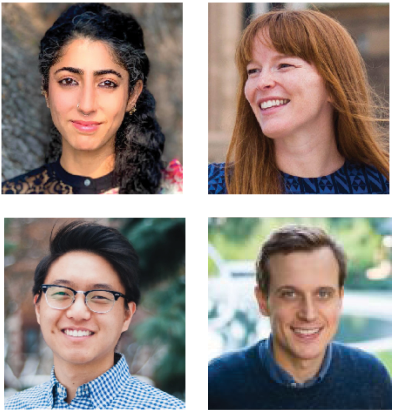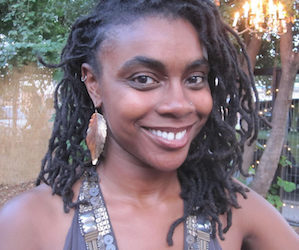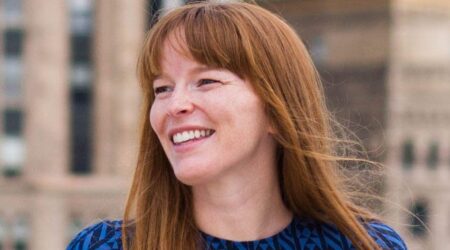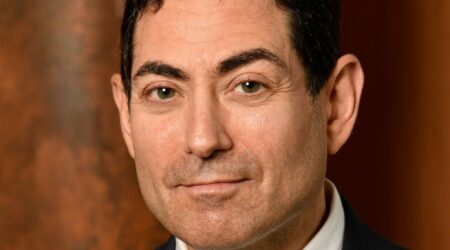How are climate change and genetically modified crops affecting farmers in India? What is the relationship between slavery and incarceration in the United States? How has the trauma of apartheid been passed through generations in South Africa?
These are among the questions that will be explored by four UC Berkeley professors who have been selected to be Matrix Faculty Fellows for the 2023-2024 academic year. The scholars are Rebecca Herman, Assistant Professor in the Department of History; Andrew Wooyoung Kim, Assistant Professor in the Department of Anthropology; Benjamin Schoefer, Associate Professor in the Department of Economics; and Aarti Sethi, Assistant Professor in the Department of Anthropology.
Launched in 2022, the Matrix Faculty Fellows Program supports assistant- and associate-level faculty members at UC Berkeley for work on research that has a significant impact in multiple disciplines in the social sciences. Fellows are chosen for the impact of their work in their home discipline, as well as the project’s potential impact and interest to scholars in other fields, aligning with the mission of Social Science Matrix to support cross-disciplinary research.
Matrix Faculty Fellows receive a course release (i.e., a reduced teaching obligation) to allow them to pursue work on publications and/or a book manuscript. The professors will also participate in Matrix programs, for example by contributing a website feature, participating in a panel discussion, or holding a workshop on a topic related to their research.
“This group of Matrix Faculty Fellows are pursuing research that spans disciplines while addressing incredibly important and topical issues,” says Marion Fourcade. “We look forward to their contributions to our intellectual life.”
Below are brief profiles of this year’s Matrix Faculty Fellows, adapted from their proposals.
Rebecca Herman, Assistant Professor, Department of History
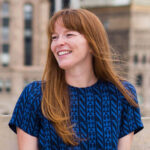
Professor Rebecca Herman will use her Matrix Faculty Fellowship to work on “The Global Wilderness: Antarctica in a World After Empire,” an in-progress book focused on the struggle over the future of Antarctica in the second half of the 20th century, when countries began to negotiate ground rules for the exploitation of Antarctica’s mineral resources — and competing visions for Antarctica arose in opposition.
“Leaders of the Third World insisted that Antarctica belonged to the ‘global commons,’ akin to the deep seas and outer space,” Herman explains, “while a rising global environmental movement fought to declare Antarctica a protected ‘World Park,’ off limits to commercial exploitation entirely. Against this backdrop, Argentina and Chile set about strengthening their national claims with performative acts of sovereignty. In the end, environmental protection won the day, and Antarctica became the most protected place on earth, even as it remains among the most vulnerable.”
“By bringing together the high politics of conflicts over Antarctic governance with the intimate stories of the people who executed it, this book aims to render complicated matters of environmental governance and global inequality intelligible and compelling to a broad readership,” Herman wote.
In addition to writing her book, Herman plans to convene a Matrix on Point discussion focused on “Environmental Justice & Environmental Governance: Past, Present, and Future,” which will bring together faculty working on issues related to climate equity, environmental justice, and environmental politics. “The discussion would invite participants to reflect on how their disciplinary and geographic perspectives (as well as generational, if so inclined) informs their view of inequality in international environmental politics, providing illustrative examples from their research.”
Andrew Wooyoung Kim, Assistant Professor, Department of Anthropology, UC Berkeley
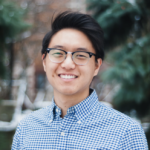
Integrating epidemiological, biological, and anthropological theories and methods, Professor Andrew Wooyoung Kim’s research examines the intergenerational effects of maternal exposure to trauma from South Africa’s apartheid on the mental health and physiology of adult children, while also exploring the reversibility of such effects through interventions like social support.
Kim’s project, “Breaking cycles, healing minds: Exploring the ameliorative psychobiological effects of social support to address intergenerational trauma from South African apartheid,” is based on analysis of data from a 30-year, multigenerational birth cohort based in Soweto, South Africa. He studies the biosocial mechanisms that underlie the intergenerational transmission of trauma through the alteration of stress biology.
His work also aims to inform the development of interventions aimed at preventing and treating stress-related diseases. He will publish his findings, draft grant applications, and host public discussions on healing from intergenerational trauma.
As part of his Matrix Fellowship, he will also organize a mini-conference titled “Historical Trauma and Healing Justice: Research, Practice, and Policy for the Future”, which aims to highlight both recent and exemplary initiatives for overcoming historical trauma across multiple contexts — and offer practical skills for positive mental health.
“Ultimately, I hope these findings will advance public health interventions for historically oppressed communities and help societies overcome the lasting consequences of intergenerational trauma,” he wrote in his proposal.
Benjamin Schoefer, Associate Professor, Department of Economics, UC Berkeley
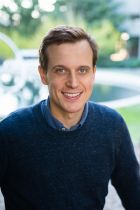 In his project, “A Macroeconomic Analysis of Universal Basic Income: Combining Theory and Evidence,” Professor Benjamin Schoefer will examine the effects of Universal Basic Income (UBI) in a rich and realistic macroeconomic model of the United States (and potentially other countries).
In his project, “A Macroeconomic Analysis of Universal Basic Income: Combining Theory and Evidence,” Professor Benjamin Schoefer will examine the effects of Universal Basic Income (UBI) in a rich and realistic macroeconomic model of the United States (and potentially other countries).
Together with a team of graduate student coauthors and undergraduates, he will adapt “a frontier model of the United States macroeconomy with heterogenous households, income risk, credit constraints, capital accumulation, educational choices, inheritances, wage bargaining, and firm monopsony,” Schoefer explained in his proposal.
His project will also represent key dimensions of the US status-quo welfare system. “I will then draw on existing microempirical evidence as well as non-macro-evidence on UBI-like programs to calibrate the features (parameters) of the model,” he wrote. “The machinery of the model will contrast short-run and transition effects of the policy (when certain margins, such as educational choices, are not active) with longer-run effects (featuring richer effects that examine shifts in educational attachment and occupational choices).”
He also aims to organize an interdisciplinary series of events or a mini-conference. “An additional goal of my course release will be to prepare a potential new course on ‘Work: its Past, Present and Future,’ which I am potentially hoping to teach to undergraduates in the future,” Schoefer wrote.
Aarti Sethi, Assistant Professor, Department of Anthropology

As a Matrix Faculty Felllow, Professor Aarti Sethi will complete the writing of her manuscript, “Hotspot: Suicide, Climate and Debt in Central India,” which explores the transformation of agriculture underway in contemporary rural India.
Since 1997, over 250,000 farmers have taken their own lives across India, the vast majority concentrated in the central Indian cotton-belt, a region known as Vidarbha, where farmers face crushing debt due to climate change and the use of genetically modified crops.
The phenomenon of farmers’ suicides is not restricted to India, Sethi notes, as suicides have been reported in nations such as the United States, Canada, Japan, and Sri Lanka. “While my own work is focused in central India, these are questions that resonate in farming communities around the world, particularly in the Global South,” Sethi wrote in her proposal. “Farming debt and climate change drive distress migration, land dispossession, and social alienation.”
In addition to writing her book, Sethi plans to organize a one day mini-conference at Matrix addressing the conjunctions of agriculture, debt, and climate change. “This conference would examine the social and material entanglements through which debt relations produce new subjectivities, social forms, and struggles for justice in the shadow of late-capitalist transformations of the agrarian landscape,” she explained.
